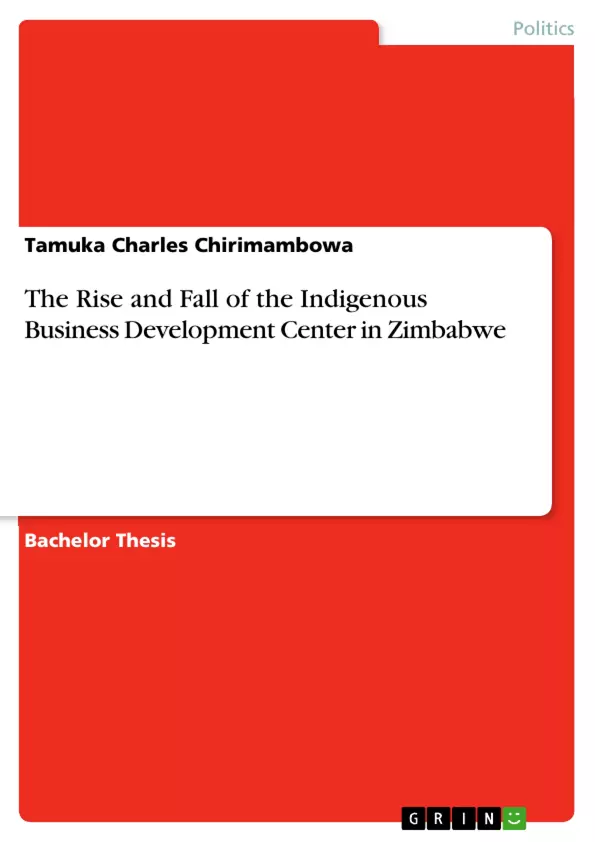Economic reform has become one of the major necessities of post-colonial African states, given years of slavery, apartheid, colonialism and underdevelopment. Many scholars have argued that Africa’s lack of development is due to the lack of African participation within the economic sphere, especially as a business class or ‘bourgeoisie’. They contend that African participation in business has been rare, and where granted it has been mostly within the peripheries or petty commerce. This study will investigate Zimbabwe’s IBDC with a view to going some way to answering the major question that arises out of this argument: is creating a nationalist indigenous entrepreneurial class the answer to Africa’s development problems? The focus of this study will be on the emergence of the IBDC as a vehicle for black empowerment. It will attempt to account for its successes, its failures, and its ultimate demise. The research will also chart how some of Zimbabwe's most successful black entrepreneurs, some who have managed to establish a global presence, got their start with this organization, and how they proceeded when the IBDC ceased to exist.The study will also proceed to examine the Indigenous Business Women's Organization and the Affirmative Action Group, similar organisations that came after the IBDC. Crucial within this research agenda is the interrogation of the role of the state in post colonial Africa: can it be a catalyst for economic empowerment, or is it an inhibitor? Finally, efforts will be made to investigate the complementarities and contradictions of efforts to create a black business class with poverty alleviation policies.
Inhaltsverzeichnis (Table of Contents)
- Chapter 1: Post Colonial Period...
- Chapter 2: First Decade of Independence...
- Chapter 3: Rise and Fall of the IBDC..
- Chapter 4: Empowerment for whom?
Zielsetzung und Themenschwerpunkte (Objectives and Key Themes)
This paper examines the rise and fall of the Indigenous Business Development Center (IBDC) in Zimbabwe. It aims to analyze the historical context of the IBDC's development, its successes and failures, and its ultimate demise. The paper also explores the role of the state in post-colonial Africa and whether it can be a catalyst for economic empowerment or an inhibitor. Key themes include:- The role of the state in economic empowerment
- The development of an indigenous entrepreneurial class
- The IBDC's successes, failures, and demise
- The relationship between poverty alleviation policies and efforts to create a black business class
Zusammenfassung der Kapitel (Chapter Summaries)
- **Chapter 1: Post Colonial Period...**: This chapter sets the stage for the emergence of the IBDC by examining the economic and political landscape of Zimbabwe in the post-colonial era. It explores the challenges faced by newly independent African states, particularly the need for economic reform and the lack of African participation in the business sphere.
- **Chapter 2: First Decade of Independence...**: This chapter examines the first decade of Zimbabwe's independence and the context in which the IBDC emerged. It explores the policies and initiatives implemented by the government to promote indigenous business development and the challenges faced by black entrepreneurs.
- **Chapter 3: Rise and Fall of the IBDC..**: This chapter delves into the history of the IBDC, its formation, its successes, and its eventual demise. It analyzes the factors that contributed to the IBDC's success, as well as the challenges it faced that ultimately led to its closure.
Schlüsselwörter (Keywords)
The main keywords and focus topics of this work include indigenous business development, economic empowerment, black entrepreneurship, state intervention, post-colonial Africa, poverty alleviation, and the role of the state.- Quote paper
- Tamuka Charles Chirimambowa (Author), 2007, The Rise and Fall of the Indigenous Business Development Center in Zimbabwe, Munich, GRIN Verlag, https://www.grin.com/document/191065



